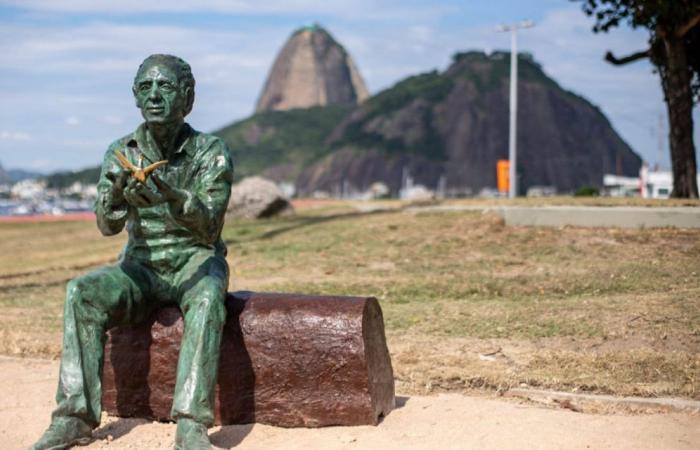
Sociologist Betinho is immortalized in a statue on Botafogo beachRenan Areias / Agência O Dia
Published 03/21/2024 17:05 | Updated 03/21/2024 18:12
The statue in honor of the sociologist Herbert de Souza, known as Betinho, was inaugurated this Thursday morning (21), at Praia de Botafogo, at Rua São Clemente, Zona Sul. The human rights activist – and also one of the the country’s main names in the fight against hunger – was portrayed holding a hummingbird, in reference to the ‘hummingbird fable’, which speaks of solidarity and represents his legacy.
Whenever he was asked whether his and other Brazilians’ actions were not small in the face of a problem as serious as hunger in Brazil, which affected around 32 million people in the 90s, Betinho said that the hummingbird used its beak to try to put out a forest fire. The bird knows that it would not solve the fire alone, but it sets an example that if every animal in the forest does its part, the fire will stop.
The Rio neighborhood chosen to house the sculpture was the place where Betinho lived until the end of his life. Although he was born in Bocaiúva, in Minas Gerais, he chose to live in the wonderful city after returning from exile imposed during the dictatorship. There, he also founded the Brazilian Institute of Social and Economic Analysis (Ibase) and the Brazilian Interdisciplinary AIDS Association (Abia).
The sociologist, who died in 1997, is also the founder of Citizenship Action, considered one of the largest campaigns to combat hunger in the history of Latin America. The movement, launched in 1993, innovated by calling on the entire country to take an active role in combating extreme poverty. Since then, the NGO has helped more than 26 million people and distributed 55 thousand kilos of food.
Who was Betinho
Betinho founded Ibase in 1980 and, in the 1990s, became a symbol of citizenship in Brazil by leading the Citizenship Action against Hunger, Misery and for Life, popularly known as the campaign against hunger. The sociologist mobilized Brazilian society to confront poverty and inequalities. Hemophiliac, he died of AIDS on August 9, 1997, leaving an example of solidarity and struggle for social transformation.
The mobilization against hunger was not the only front in which Betinho was involved since returning from exile. Still in the 80s, he was an organizer of the National Campaign for Agrarian Reform. Together with other entities, Ibase organized the “Land and Democracy” event in 1990, which took 200,000 people to Aterro do Flamengo, in Rio de Janeiro.
In 1986, after learning that he was a carrier of the HIV virus, Betinho helped found the Brazilian Interdisciplinary AIDS Association (Abia). In 1992, he was part of the Movement for Ethics in Politics, which culminated in the impeachment of then president Fernando Collor de Mello.
Betinho’s activism began as a teenager, at Ação Católica, in Belo Horizonte. At UFMG, he was one of the founders of Ação Popular (AP), an organization formed by a Catholic pro-socialism group. He graduated in Sociology in 1962 and became involved in the fight for the basic reforms of the João Goulart government.
Betinho resisted the 1964 coup and the dictatorship that was installed in Brazil. When repression intensified, he went into exile in 1971. He lived in Chile, Canada and Mexico.
At the end of the 70s, the return of Betinho, Henfil’s brother, became a hallmark of the campaign for amnesty because of the song “The drunk and the equilibrista”, by Aldir Blanc and João Bosco. Betinho returned to Brazil in 79 and created Ibase two years later, together with fellow exiles Carlos Afonso and Marcos Arruda.
Betinho’s archive is available for consultation at the Center for Research and Documentation on Contemporary History of Brazil (CPDOC) at Fundação Getúlio Vargas (FGV), in Rio.
In 2012, Betinho’s story was recognized by UNESCO (United Nations Educational, Scientific and Cultural Organization) as an important part of world memory. The Herbert de Souza archive, from CPDOC at Fundação Getúlio Vargas (FGV), was nominated for the National Registry of UNESCO’s Memory of the World Program.
The decision was taken by the Brazilian National Committee, a body linked to the UNESCO program, and the diploma ceremony took place on December 4th. In the same year, Ibase launched the book “O Brasil de Betinho”, written by Dulce Pandolfi, Augusto Gazir and Lucas Corrêa.
Tags: Statue sociologist Betinho reference hummingbird fable understand Rio Janeiro
--




